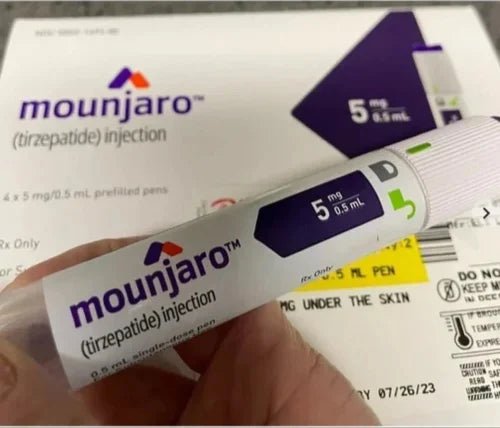The Diabetes Drug That Could Overshadow Ozempic
Discover the latest diabetes drug that is generating buzz in the health community: Mounjaro. As people seek new ways to manage their weight, Mounjaro has emerged as a potential game-changer. Although currently approved only for Type 2 diabetes, Mounjaro is already being used off-label for weight loss.
Research suggests that Mounjaro may be even more potent than its popular counterparts, Ozempic and Wegovy, with studies showing significant weight loss and improved blood sugar levels.
Despite not being officially recognized as a weight loss drug, there is speculation that the FDA may soon grant approval for Mounjaro's use in weight management. As demand grows and potential benefits are uncovered, Mounjaro could overshadow Ozempic in both attention and sales.
Background Information
In recent years, there has been a surge in the popularity of injectable diabetes medications for weight loss. Two drugs that have garnered significant attention are Ozempic and Wegovy. However, another drug called Mounjaro is now emerging as a potential rival to these medications. Mounjaro, though not yet approved for weight loss, has gained traction among individuals looking to shed pounds. Research has suggested that Mounjaro could be even more effective than Ozempic and Wegovy in terms of weight loss and blood sugar reduction. This article will explore the current research findings on Mounjaro, its mechanism of action, safety considerations, and its potential impact on diabetes patients.
Introduction to Mounjaro
Mounjaro is an injectable diabetes medication that is currently approved by the Food and Drug Administration (FDA) for the treatment of Type 2 diabetes. However, it has been increasingly used off-label for weight loss due to its potential effectiveness in this area. Users of Mounjaro have reported significant weight loss, with some claiming to have lost up to 25 pounds. While Mounjaro's official website states that it is not a weight loss drug, there is speculation that the FDA may authorize the medication for weight management in the near future.
Comparison with Ozempic and Wegovy
Research findings have indicated that Mounjaro may surpass both Ozempic and Wegovy in terms of weight loss and blood sugar reduction. A study funded by Eli Lilly, the manufacturer of Mounjaro, found that participants who were both obese and had diabetes lost around 15 percent of their body weight while taking tirzepatide, the active ingredient in Mounjaro. Another major study comparing these drugs discovered that tirzepatide led to sharper reductions in blood sugar levels and greater weight loss than the other medications. However, it is worth noting that the study compared different doses of the medications, making it challenging to directly compare their effectiveness.

Challenges in Comparing Doses
One of the challenges in comparing the effectiveness of Mounjaro with Ozempic and Wegovy is the difference in doses. The aforementioned study comparing the drugs involved different doses of each medication, making it difficult to determine the true head-to-head efficacy of these drugs. Further research is needed to assess the comparative effectiveness of different doses and determine the optimal dose for maximum weight loss and blood sugar reduction.
Approval and Speculation
Currently, Mounjaro is only approved for the treatment of Type 2 diabetes by the FDA. However, there is speculation that the FDA could authorize the medication for weight management in the near future. Eli Lilly announced that the FDA had fast-tracked the examination and approval process for tirzepatide in adults who are obese or overweight. While the FDA cannot confirm or comment on pending/potential product applications, the increased demand for Mounjaro suggests that it may soon overshadow both Ozempic and Wegovy in terms of media attention and sales.
Demand and Availability
The demand for Mounjaro is growing rapidly, with many individuals seeking the medication for weight management. After a two-month shortage, Mounjaro is now largely back in stock, although some diabetes patients still face difficulties accessing it. Physicians often advise patients to try calling different pharmacies or adjust doses to stretch the medication supply. The high demand for Mounjaro highlights the need for improved patient access and availability.
Mechanism of Action
Mounjaro, with its active ingredient tirzepatide, mimics two hormones naturally produced in the body: glucagon-like peptide-1 (GLP-1) and glucose-dependent insulinotropic polypeptide (GIP). In contrast, Ozempic and Wegovy only simulate GLP-1. Researchers believe that tirzepatide's effectiveness in lowering blood sugar levels and inducing weight loss is due to the synergistic effects of these two hormones. By slowing stomach emptying and suppressing appetite, tirzepatide creates a feeling of fullness and reduces hunger signals in the brain.

Synergistic Effects on Blood Sugar Reduction and Weight Loss
Studies have shown that tirzepatide can lead to significant weight loss in both diabetic and non-diabetic individuals. A study presented at an American Diabetes Association conference revealed that non-diabetic participants taking tirzepatide lost up to 22.5 percent of their body weight after 72 weeks. This weight loss was comparable to the results achieved through weight loss surgery. The synergistic effects of GLP-1 and GIP, mimicked by tirzepatide, contribute to these impressive outcomes in blood sugar reduction and weight loss.
Effects on Stomach Emptying and Appetite Suppression
One of the ways in which tirzepatide aids in weight loss is by slowing down the emptying of the stomach. This means that individuals feel fuller for longer periods, reducing the urge to overeat. Additionally, tirzepatide inhibits hunger signals in the brain, effectively suppressing appetite. These dual mechanisms of action contribute to the significant weight loss observed in individuals using Mounjaro.

Lack of Research on Long-term Effects
Despite the promising results of Mounjaro in the short term, there is a lack of research on its long-term effects. As Mounjaro needs to be taken continuously to sustain weight loss and blood sugar reduction, understanding the potential long-term consequences is essential. Researchers and healthcare professionals emphasize the need for further studies to assess the safety and efficacy of Mounjaro over extended periods.
Continued Use of Medication for Sustaining Results
To maintain the benefits of weight loss and blood sugar reduction achieved through Mounjaro, individuals must continue taking the medication regularly. Discontinuing Mounjaro could result in weight regain and a deterioration in blood sugar control. However, considering the lack of long-term research, it is crucial for individuals to weigh the potential benefits against the risks before committing to long-term medication use.
Safety Concerns
While Mounjaro has demonstrated significant weight loss and blood sugar reduction, it is essential to consider the safety concerns associated with the medication. Compared to Ozempic and Wegovy, Mounjaro may lead to more severe side effects, including nausea, vomiting, diarrhea, and stomach pain. In rare cases, the use of Mounjaro can result in renal failure, pancreatitis, hypoglycemia, and gastrointestinal bleeding. Additionally, there is limited information on how Mounjaro may affect individuals who do not have diabetes or obesity, further highlighting safety concerns.
Comparison to Ozempic and Wegovy
When comparing Mounjaro to Ozempic and Wegovy, it is crucial to consider these medications' similarities and differences. Mounjaro mimics both GLP-1 and GIP, while Ozempic and Wegovy only stimulate GLP-1. The synergistic effects of both hormones in Mounjaro may contribute to its potential effectiveness in weight loss and blood sugar reduction. However, the different doses used in comparing these medications make it challenging to make direct comparisons. Despite these differences, all three medications have demonstrated significant efficacy in managing weight and blood sugar levels.
Lack of Information for Non-Diabetic and Non-Obese Individuals
One of the limitations of current research on Mounjaro is the lack of information on its use in non-diabetic and non-obese individuals. The existing studies have primarily focused on the effects of Mounjaro in individuals with diabetes and obesity. The safety and effectiveness of Mounjaro in other populations remain uncertain. Without sufficient information, individuals without diabetes or obesity should exercise caution when considering the use of Mounjaro for weight management.
Necessity of Close Monitoring
Due to the potential risks and side effects associated with Mounjaro, close medical supervision is necessary for individuals using the medication. Physicians and healthcare professionals can closely monitor individuals for any adverse reactions and adjust doses accordingly. There is a risk that extreme lack of appetite caused by Mounjaro could lead to malnourishment and disordered eating. The goal of using Mounjaro is to manage weight and blood sugar without compromising overall health and well-being.
Risk of Malnourishment and Disordered Eating
While Mounjaro can be effective in reducing appetite and promoting weight loss, it is important to strike a balance to avoid malnourishment and disordered eating. Extreme hunger suppression is not the goal, as it can lead to severe nutritional deficiencies and unhealthy eating patterns. Close medical supervision and regular monitoring can help individuals using Mounjaro maintain a healthy appetite and avoid potential risks associated with malnourishment and disordered eating.
Manufacturer's Stance
Eli Lilly, the manufacturer of Mounjaro, has made an official statement clarifying that Mounjaro is only approved for the treatment of Type 2 diabetes as an adjunct to diet and exercise. The company does not promote or encourage the off-label use of any of their medications, including Mounjaro. However, concerns have been raised about the promotion of off-label use by pharmaceutical companies, potentially leading to limited patient access and misuse of the medication.
Promotion of Off-Label Use
Despite the manufacturer's official stance, there have been reports of off-label use of Mounjaro for weight management. Off-label use refers to the use of a medication for a purpose other than its FDA-approved indication. The allure of significant weight loss has attracted individuals to seek out Mounjaro for this purpose. Off-label use raises concerns about the lack of comprehensive research and regulation surrounding the medication's safety and effectiveness in weight management.
Concerns about Patient Access
The high demand for Mounjaro coupled with ongoing shortages has created challenges in patient access to the medication. Many diabetes patients looking to use Mounjaro for weight management have faced difficulties in obtaining the medication. Physicians have advised patients to explore different pharmacies and adjust doses to accommodate the limited availability. The lack of patient access to Mounjaro raises concerns about equitable healthcare and the need for improved availability of weight management medications.
Potential Consequences for Diabetes Patients
The emergence of Mounjaro as a potentially powerful weight loss medication has important implications for diabetes patients. The use of Mounjaro for weight management may lead to better glycemic control and decreased reliance on other diabetes medications. However, it is crucial for these patients to be closely monitored to ensure their overall health and well-being are not compromised. The potential for severe side effects and the need for continued medication use must be weighed against the benefits of weight loss in diabetes management.
Need for Further Monitoring and Support
Given the growing popularity and demand for Mounjaro, there is a need for further monitoring and support for individuals using the medication. Close medical supervision, regular check-ups, and ongoing support from healthcare professionals can help patients navigate the potential risks and benefits of Mounjaro. Additionally, comprehensive education and resources should be available to guide individuals using Mounjaro for weight management and ensure they receive the necessary support throughout their weight loss journey.
Lessons from Previous Weight Loss Drugs
The introduction of Mounjaro and its potential impact on weight management in diabetes patients brings with it valuable lessons from previous weight loss drugs. Historical experiences with weight loss medications like fen-phen have highlighted the importance of thorough research and monitoring for long-term safety and efficacy. The potential for adverse effects and unforeseen consequences underscores the need for cautious optimism and careful consideration of the risks and benefits associated with Mounjaro.
In conclusion, Mounjaro has emerged as a potential rival to popular weight loss medications like Ozempic and Wegovy. Current research suggests that Mounjaro may outperform these medications in terms of weight loss and blood sugar reduction. However, further studies are needed to determine the optimal dose and long-term effects of Mounjaro. Safety considerations and the importance of close medical supervision cannot be overlooked. As demand for Mounjaro grows, patient access and support become crucial factors to consider. The future approval and use of Mounjaro for weight management will undoubtedly impact diabetes patients and require ongoing monitoring and support to ensure optimal outcomes.






